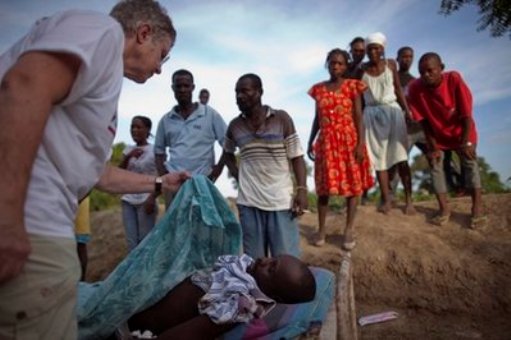
Editor’s note: George Rupp is the president of the International Rescue Committee.
After the earthquake struck Haiti on Jan. 12, 2010, the International Rescue Committee moved quickly to provide clean water, sanitation, and health care, and to meet the special needs of women and girls. since then our mission has grown to include health care, child welfare, economic recovery and development, and programs to combat violence against women. we provide direct support to nearly 100,000 people in 30 camps.
Although Haiti’s entrenched poverty and shattered infrastructure have slowed overall recovery efforts, we will continue to work alongside the Haitian people as long as it takes to ensure that communities are fully recovered and able to thrive. The IRC’s focused relief efforts over the past year have made a tangible impact – and saved lives. Here is an overview.
Water, Sanitation and Hygiene
* The IRC has worked in partnership with government agencies to rehabilitate water and sanitation systems at health clinics and youth centers and build latrines, showers, and safe water points in settlements for displaced people in Port-au-Prince, Leogane and surrounding areas.
* Our community hygiene-promotion volunteers are educating residents—130,000 so far—on good health and disease-prevention practices.
* we have installed 30 kiosks in camps and communities to distribute oral rehydration salts weekly to Haitians suffering cholera symptoms.
Primary Health Care
* IRC health teams were deployed to the devastated areas where no other aid organizations were present and where outbreaks of disease were likely.
* we ran health clinics in Carrefour and Delmas, two hard-hit areas of Port-au-Prince. The staff of the clinics has conducted 24,000 consultations, administered over 8,500 vaccinations and vitamin a doses, performed over 700 malaria tests, monitored over 3,400 children for malnutrition, and delivered prenatal care to over 750 women.
* The Carrefour clinic has also served as a cholera treatment unit. Nurses from the clinic and a special IRC cholera response team have carried out education and prevention activities in 30 camps.
Children and Youth
* The IRC has established safe spaces in 11 camps, where children ages 3 to 14 can learn, heal, and play, and we are creating additional centers for non-formal education and recreational activities.
* we have reunited nearly 150 separated children with family members or other caregivers. we have also trained case workers from other agencies to identify and register missing children.
* The IRC offers older teenagers vocational skills training and helps them obtain safe, age-appropriate work.
Women and Girls
* Women and girls are at the center of the IRC’s relief effort. The IRC was the first agency to deploy a specialist dedicated to reducing sexual violence and runs a full-time program to help ensure the safety of women and girls.
* The IRC has increased access to medical treatment and psychosocial services and provides safe spaces for women and girls who have experienced sexual or physical violence.
* The IRC distributed solar lights in dangerous areas to enhance safety and security and constructed private bathing stations to ensure privacy.
Economic Recovery and Development
* Our cash-for-work program has put more than 2,000 Haitians to work rebuilding infrastructure in Port-au-Prince and Leogane.
* The IRC provides technical expertise, tools, construction materials, and other resources to workers building more permanent camp facilities in preparation for jobs in the building trades.
* Women have equal access to employment opportunities in all IRC-sponsored projects and these opportunities are not limited by traditional gender roles.
The IRC is invested in Haiti’s long-term recovery. one year on, we look back on our progress while acknowledging that our work is far from done.
How you can helpOn this one-year anniversary of the earthquake, renew your commitment to the people of Haiti – and to others who are fleeing disaster, war, and persecution around the world.
Your donation will support the IRC’s efforts aiding people at their moment of greatest need—providing shelter, medical care, safety, and long-term support to rebuild communities.